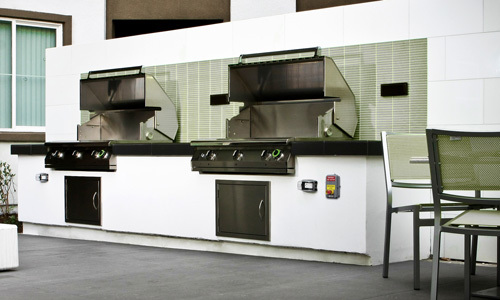Commercial vs. Residential Grills: What’s the Difference?
6 minute read | Grills

At AEI Corporation, we offer and service a wide range of patio grills—both residential and commercial. While they may look similar at first glance, there are key differences that can impact your choice depending on how you plan to use the grill. Whether you're outfitting a home or a multi-family property, understanding these distinctions is essential.
In this post, we'll break down the similarities and differences between residential and commercial grills, helping you choose the right one for your needs. Let's dive in!
Understanding the Settings: Residential vs. Commercial
To grasp the differences, it helps to understand where each type of grill is typically used.
Residential Grills
Residential grills are designed for single-family homes, whether owned or rented. They’re used by the homeowner, their family, and occasional guests. These grills are often portable or built-in, depending on the user’s preference and space availability. In rental properties, permission from the landlord might be required before installing a permanent unit.
Commercial Grills
Commercial grills are found in settings like apartment complexes, condos, resorts, and other multi-family environments. These grills are intended for shared use among residents or their visitors. Unlike residential units, commercial grills are built to handle more frequent use and higher volumes of people. They also come with additional safety features to ensure proper use in public or semi-public spaces.
Common Features Between Both Types
Despite the differences in usage, both residential and commercial grills share several key characteristics:
- Power Source: Available in propane or natural gas variants.
- Materials: Constructed with high-quality stainless steel and cast aluminum, ensuring durability and resistance to rust.
- Mounting Options: Can be mounted on carts, islands, countertops, or pedestals.
- Accessories: Offer a variety of add-ons like side burners, rotisserie kits, storage drawers, and timers.
- Warranty & Support: Both types come with strong warranties and access to replacement parts through AEI.
Key Differences You Should Know
While the two types of grills are very similar, there are some important distinctions to consider:
- Size and Capacity: Commercial grills are generally larger, designed to serve more people at once.
- Safety Features: Commercial models often include a 60-minute automatic shut-off timer and theft-proof control knobs, which help prevent misuse and damage.
- Usage Environment: Residential grills are meant for private use, while commercial ones are for shared or public areas.
That said, residential users can still benefit from some of the advanced features found in commercial grills, such as the 60-minute timer and durable construction. For example, the A-Series and Legacy grills from AEI offer many of the same benefits as commercial models, making them great choices for homeowners who want extra safety and performance.
Whether you're looking for a grill for your backyard or a community space, AEI has the right solution for you. Our grills are built to last, backed by excellent customer support, and designed to deliver exceptional cooking results every time.
Want more information? Have a question? Contact us today, and we will be happy to help!
Dance Studio Wooden Floor,Dance Studio Floor,Sports Floor For Dance Studio,Solid Wooden Flooring
Jiangsu Ruidong Sports Technology Co., Ltd , https://www.cnruidongsports.com